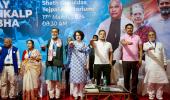Maharashtra, Gujarat, Madhya Pradesh, Chhattisgarh and Rajasthan will continue to be bipolar contests as would Uttarakhand, Himachal Pradesh, Haryana, Bihar and Jharkhand.

Close to half of the total 543 Lok Sabha seats are bracing for multi-cornered fight this time, making the contest way more interesting and intense than it was in the 2019 elections.
And, interestingly, this multi-cornered contest on over 45 per cent seats is happening despite the absence of a credible 'third front', and the two principal rival alliances, the National Democratic Alliance and the Indian National Developmental Inclusive Alliance, together comprising 80 of the country's leading political parties.
For example, in 2019, key states, such as Uttar Pradesh, Tamil Nadu and Andhra Pradesh had bipolar contests, which could turn out to be different this time.
With 144 MPs, these three states cumulatively elect a fourth of the Lok Sabha's total strength.
In UP, the Samajwadi Party, Bahujan Samaj Party and Rashtriya Lok Dal had struck an alliance against the Bharatiya Janata Party-led NDA in 2019.
The Congress was not part of the Opposition alliance, and it proved to be a marginal player in UP five years back, securing a meagre 6.3 per cent of votes.
However, in 2024, the BSP isn't part of either the INDIA bloc or the NDA, and is contesting UP's 80 seats in earnest. The RLD has joined the NDA.
There is also the birth of a putative third front in UP with the Asaduddin Owaisi-led All India Majlis-e-Ittehadul Muslimeen and Pallavi Patel-led Apna Dal (Kamerawadi) coming together. Patel's party recently exited the INDIA bloc.
In Tamil Nadu, as part of its alliance with the All India Anna Dravida Munnetra Kazhagam, the BJP had contested only five of the 39 Lok Sabha seats in 2019.
The DMK-led alliance, which included the Congress and Left parties, had swept the polls.
However, for 2024, the BJP is leading a third front, comprising itself, the Pattali Makkal Katchi and others.

In Andhra Pradesh, the BJP has tied up with the Telugu Desam Party and the Jana Sena Party, while the Congress, under Y S Sharmila Reddy, expects to improve its performance.
The BJP and Congress fared poorly in 2019 as the contest was primarily between the ruling YSR Congress Party and TDP. The YSRCP had swept the polls. The TDP had exited the NDA in 2018.
The BJP emerged as the third pole in Telangana in 2019, winning four seats, and it is hopeful of consolidating its position against the ruling Congress and Bharat Rashtra Samithi.
In Kerala, the BJP-led NDA couldn't win a seat five years ago, but improved its vote share to 15.64 per cent. The party is hopeful of winning a couple of seats and increasing its vote share in Kerala in 2024.
Karnataka, meanwhile, is set to be a bipolar contest as it was in 2019.
The Janata Dal-Secular was an ally of the Congress five years back, but it is now an alliance partner of the BJP.
Maharashtra, Gujarat, Madhya Pradesh, Chhattisgarh and Rajasthan will continue to be bipolar contests as would Uttarakhand, Himachal Pradesh, Haryana, Bihar and Jharkhand.
In Assam, the All India United Democratic Front is contesting only three of the 14 seats. It will make the electoral battle a two-cornered one on the remaining 11 seats.
Contests in rest of the North East are also likely to be bipolar barring Meghalaya's Tura, where the Congress and Trinamool Congress have both fielded their candidates.
Unlike 2019, the BJP has decided to support the National People's Party on Meghalaya's Tura and Shillong seats.
The Aam Aadmi Party's success in the Gujarat assembly polls in 2022 meant the Congress has accommodated its demand to contest two seats in the state as part of the INDIA coalition.
Delhi was a three-cornered fight in 2019, but will be a bipolar one in 2024 with the Congress contesting three and AAP four.
Punjab witnessed a three-cornered contest in 2019, but is set to witness four-sided battle on this occasion since the BJP and Shiromani Akali Dal are no longer allies.
Odisha, which sends 21 MPs to the Lok Sabha, was a triangular contest in 2019, and will be in 2024.
In West Bengal, the Left parties and Congress have a seat sharing agreement.
Feature Presentation: Aslam Hunani/Rediff.com











